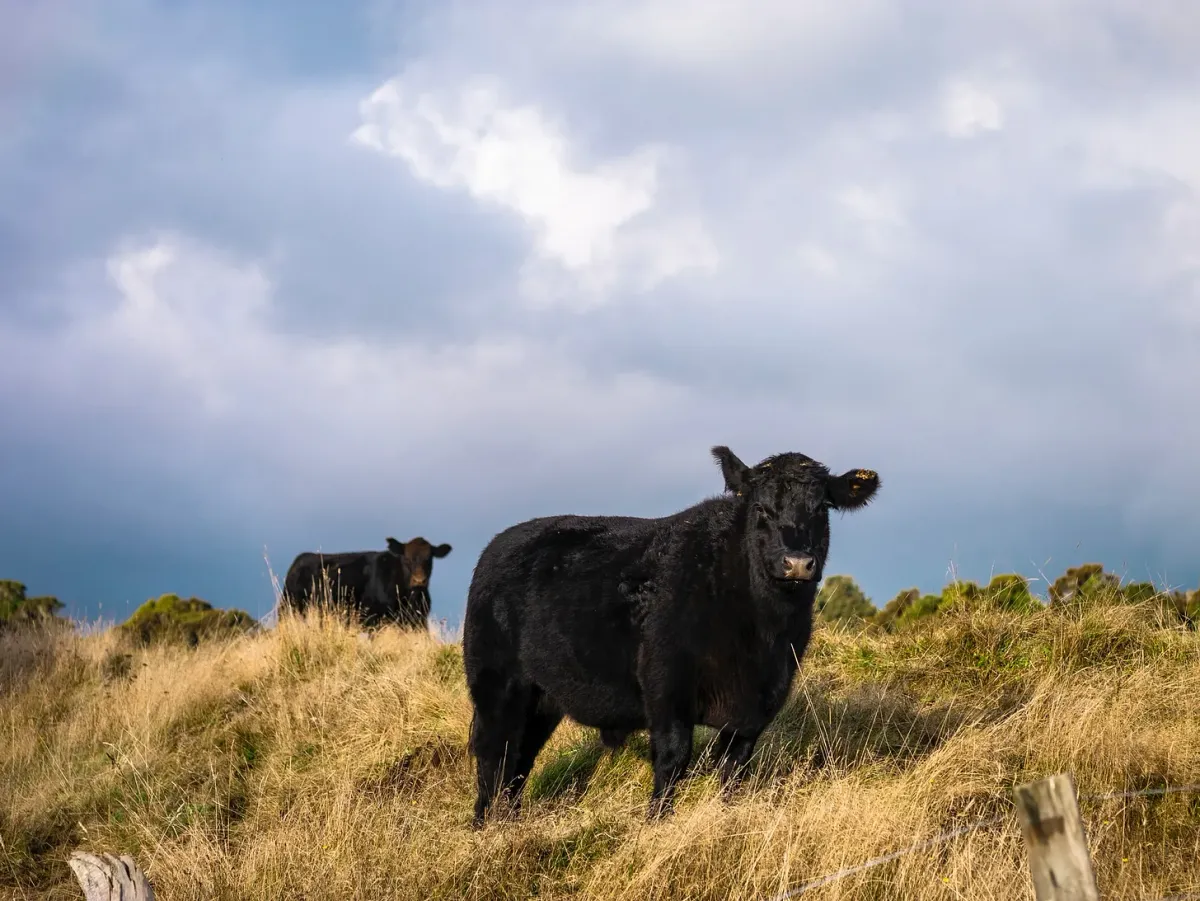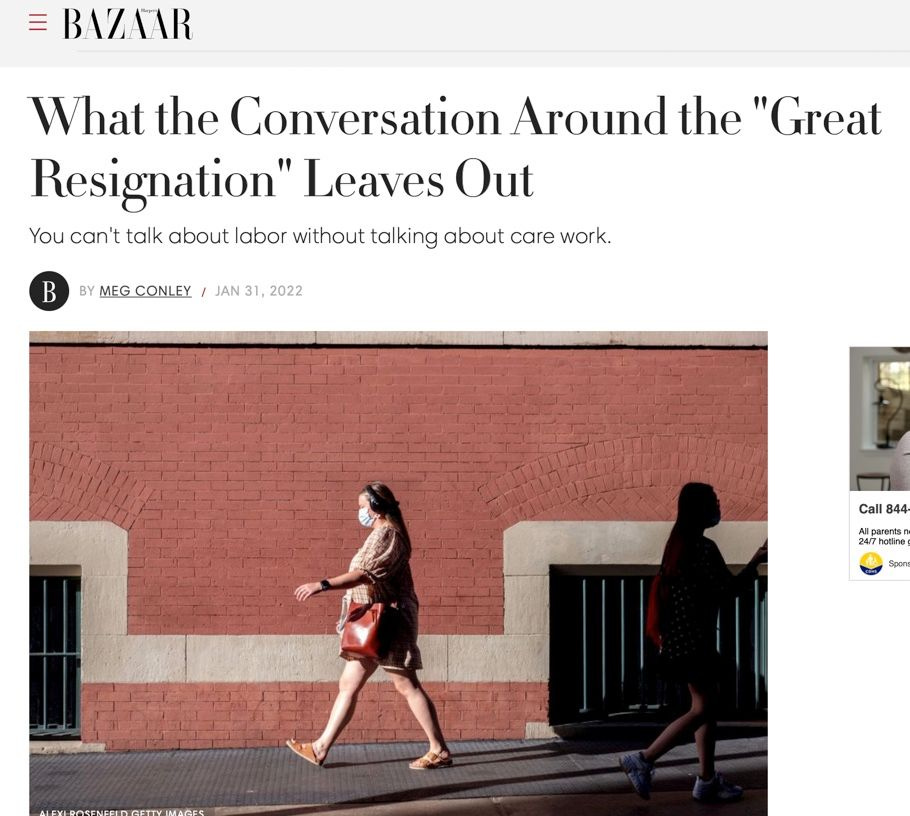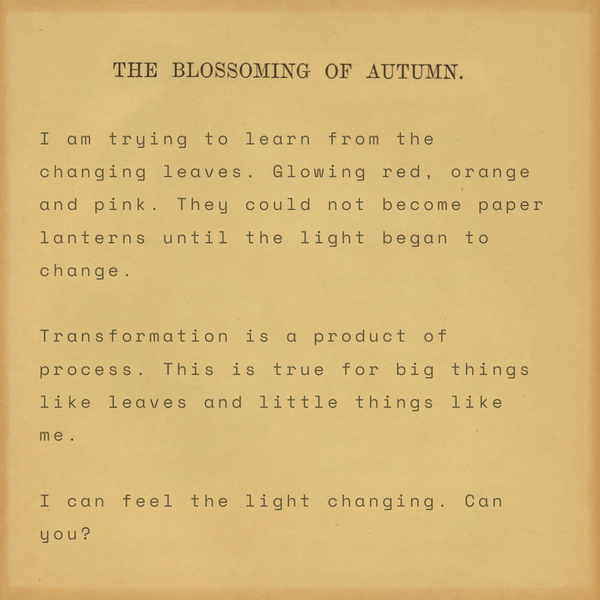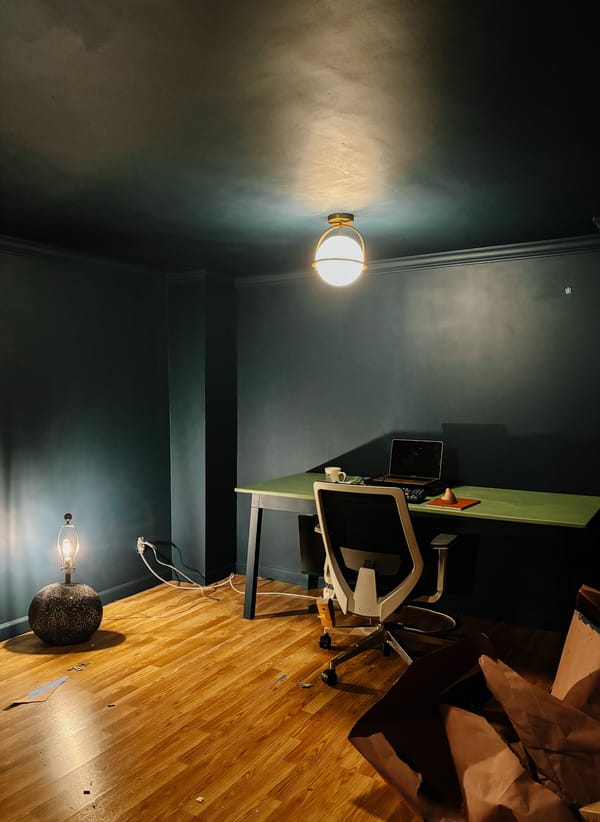Ballerina Farm + Care Work Capitalism
Two Things That Go Together

Two things:
I had a piece on care work and capitalism published in Harper's Bazaar last week. It was kind of a dream come true. I really wanted to tell my dad about it. He always thought I'd be a published writer. I thought he was wrong. He'd love that he was right. For me! But also because he loved to be right.
Grief attends, basically.
— Meg Conley (@_megconley) January 27, 2022
Since I can't tell my dad, I am going to share it here, okay? Hey Everyone Who Reads This Newsletter, GUESS WHAT?! My writing was published in Harper's Bazaar!
I even coin a term - care work capitalism. Can I sell coined terms as NFTs? Much to ponder. (NFTs are awful, I am making a dad joke.)

I'm kind of desperately proud of the piece. Here's an excerpt.
Since the Industrial Revolution, the first American capitalists created a narrative we still live in today. 19th-century men divided the home from the economy. They created a domestic sphere, a walled-off space where women were always laboring but never productive.
Unpaid care work is still held in a sphere apart from the American production boundary.[1] It is not included in GDP. If we included the unpaid production that takes place in the home and the community to our yearly gross domestic product, researchers say it would grow by at least 23 percent, or more than $4 trillion. In March 2020, The New York Times reported, “If American women earned minimum wage for the unpaid work they do around the house and caring for relatives, they would have made $1.5 trillion” in 2019. That number can only have gone up since the pandemic started. The strain put on care work during the pandemic is a feature of capitalism, not a bug. Economists won’t value social reproduction, because they acknowledge the market’s rights to care work. This is a commons problem.
The tragedy of the commons is a modern economic theory that says a resource held in common will be exhausted by inefficient use and a lack of innovation. Elinor Ostrom won the Nobel Prize in economics for her work disproving the theory. She demonstrated that communities always have and still can manage common finite resources sustainably. We don’t seem to cite her much in America.
Care work is an abundant resource managed by social systems. Caretakers are commoners doing common work. Care is abundant, but like many resources right now, it is being strained by markets. Care needs keeping if we are all going to be sustained by it. The problem is that capitalism has no interest in keeping things it cannot own. When confronted with a commons, capitalism tries to privatize it.
There are ways to protect the care commons. All of them are universal. A universal basic income could provide unconditional security for those who care and need care. Universal health care would acknowledge everyone qualifies for care. Universal paid leave would allow parents to care for babies. Universal childcare would allow parents to do work outside of care work. Every solution to the care crisis requires us to move to more common ground.
This week, I got to do a Q+A with Anne Helen Petersen over on Culture Study.
I've been following pregnant ballerina quasi-pig farmer beauty queen influencer (married to the son of the guy who started Jet Blue) for more than a year. There is so much going on with this account — & @_megconley is uniquely equipped to break it down: https://t.co/kmR50JsJd8
— Anne Helen Petersen (@annehelen) February 10, 2022
"Mormon culture often tells girls they should grow up to be somethinG like an AGA. Always on. Divided into compartments—one that is ready to receive whatever needs warming, one that is always prepared to produce something sustaining. A surface that is not too hot to the touch"
— Anne Helen Petersen (@annehelen) February 11, 2022
We cover hobby farming, influencers, AGA stoves, the very cool way I was raised to think about Eve, and the very complicated way that understanding of Eve interacted with many other bits of my Mormon upbringing. Here's a quick excerpt:
Mormons believe Eve was wise and right to eat the forbidden fruit in the Garden of Eden. It was a choice she made to help herself and humanity progress beyond the garden. Humanity couldn’t return to God without leaving the garden first, and Adam followed her inspired direction. That’s a pretty radical heritage to be given as a little girl in Sunday school.
I remember feeling so invigorated by that concept of Eve. But then I hit 12 years old — the age LDS boys get ordained to the priesthood. In the LDS church, the priesthood is two things. First, it is the power through which God created heaven and earth, you and me. That priesthood exists with or without a church. Second, the priesthood is the power to act and direct with God’s authority, with God’s power. It is this second priesthood that 12 year old boys receive. There are lots of callings and positions in the church that require the priesthood — including all major decision making positions at regional and international levels. I did not get the priesthood when I turned 12. Instead, I started getting modesty and marriage lessons at church. And it can feel so confusing because like…what about Eve?
If Eve had been an LDS woman in the garden, she wouldn’t have been allowed to make her choice. Because she’d have had no authority to make it. Mormon women have no official authority in the LDS church — only men can be ordained into the priesthood. And yet, LDS women are still expected to live up to Eve’s heritage. They are tasked with helping humanity progress toward heaven. Instead of walking out of a garden, they are supposed to walk into their homes and use their influence to direct their family to heaven. LDS women are also encouraged to be public from our homes — to preach and teach and, well, generally influence.
A lot of LDS women try to use persuasion in addition to influence. Persuasion is different from influence because it’s a dialogue. I am a fan of persuasion generally, but you have to have someone willing to listen to you to engage in a dialogue. As an LDS woman, it is hard to get LDS men in power to engage in a dialogue. If you believe God denied women the authority to make decisions for the church, how likely are you to let them make decisions for…anything? I think that this lack of dialogue in the places of power in their church trains LDS women in the art of influence very, very early on.
So LDS girls are given the heritage of one radical bite that took us out of a walled, static space. But then we’re basically told: “Well, really women do belong in a walled space — preferably a single-family home filled with kids. Don’t pick any forbidden fruit. Do bake some fruit pies. But you know, Eve pushed herself out into the world. So you should push yourself too — seek knowledge and accomplishment. But! Remember your knowledge and accomplishment should always be in service to your motherhood or potential motherhood. Stay in that home while also living up to Eve. Help save a world in which you are both spiritually and secularly disenfranchised.”
LDS women have been trying to be the bridge for their own tension for generations. It looks different for all of them. But a Juilliard trained ballerina dancing in her home for the entire world is definitely one manifestation. Tension can strain, but it can also expand. Sometimes it does both at the same time. With this understanding of how early LDS girls need to begin to rely on their ability to influence, it’s no wonder that many LDS women have taken to Momfluencing and Homefluencing (and now Farmfluencing) like fish who finally found water.
And — to be totally self-aware here — no wonder I’ve taken to writing. Aren’t I trying to save the world with every single little essay written from my home? I hope my writing practices persuasion more than influence. But ultimately, the roots of my writing grow into the same soil as the roots of Hannah’s dancing.
It's late on Thursday night as I type this. Still kind of amazed I get to share work here and other places. I am looking at my editorial calendar. Trying to figure out which essay comes next. Wondering what you need to read and if it's something I could write. Wondering what I need to write and if it's something you would read. Grateful you've given me the opportunity to wonder both wonders.
Thank you.




